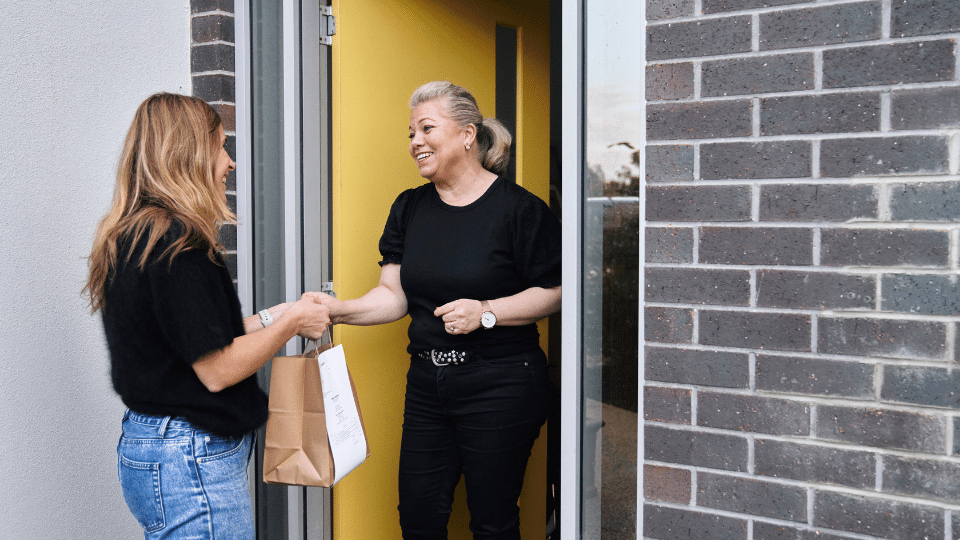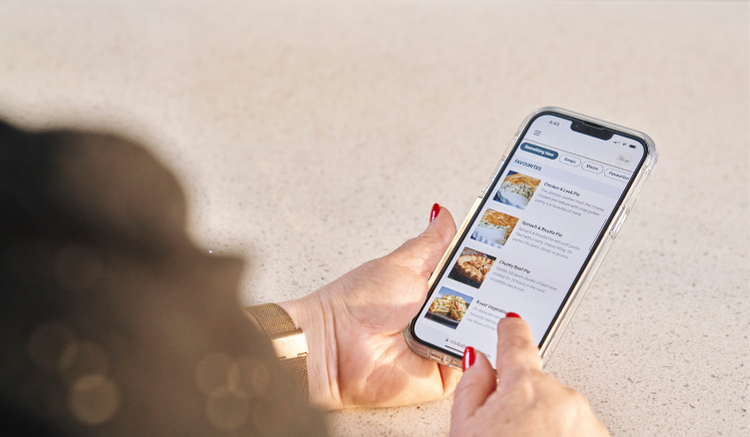Customer Love | Casting a wide net to build your customer database
This three-part comprehensive guide will provide you with a collection of ideas to help you build and nurture your list of customers. In Part 3 of this guide we encourage stepping it up by reaching out to your broader supplier and customer networks to leverage their support.
It’s sometimes tricky to know whether or not you have ‘enough’ customers signed up to receive your menu. Some customers order every week whereas others may be sporadic. If your customers are hyper local and order weekly you may not need to do anything (well done you!) but if you’re just starting out and need a bit of a buffer to ensure a regular number of orders, here are some ideas to grow your customer database.
Convert customers into social media followers
In addition to trying to convert social followers into customers which we talked about in Part 1, asking existing customers to follow you on social media is a great idea. You can do this by including this request in your regular Menu emails, or you could send a specific communication via the Messages feature on the platform or go old school style and message them or call them yourself!
When you make the request, be honest and let them know you’d like their support to grow your business. Loyal customers who hear from you every week via your Menu email and who have a connection with you will most likely be happy to support you in this way, especially if they are already active on social media. You can ask them for a quote on their experience with you to share and post a story or a tile and tag them.
TIP: Make it easy for customers - include links to your socials in your communication and be prepared to remind customers for a few weeks that you’d like their support. People can take time to act and may need a few prompts.
It’s also good practice to acknowledge and thank people who ‘follow’ you by sending them a direct message (otherwise referred to as a DM). So, if you decide to request your existing customer on your database to follow you, keep an eye on your socials and be sure to thank those who respond to your request with a ‘follow’.
Growing your social media following in a meaningful way like this with an engaged audience has the added advantage of making the job easier for people who follow you but are not receiving your menus to sign up to receive your menus.
Find your followers who have influence
Search the people and businesses who follow you via your socials, identify the ones with reach and influence, then ask for their support.
They don’t need to have a high profile; it can be anyone you’re connected with who has an engaged social media following. The person with 100 followers can have more impact than the person with 1,000 or 10,000 followers.
Before reaching out, think about who they are and who their audience is likely to be, then make a judgement on whether they are going to be relevant to your business.
Once you have your target list, send a direct message (DM) or an email to introduce your business, and let them know you’d like to discuss getting their help to grow your business. This first communication is intended to start the conversation, not close the deal.
Suitable payment for their support will depend on who they are and your relationship with them, sometimes it can be as simple as providing them with a few meals in return for their support, through to being prepared to pay for their support.
As part of your agreement, it’s important to be clear on what they’re going to post and what they’re going to say. You will need to provide a brief, but you should not have an expectation that they’ll say or post exactly what you want, it needs to be real, genuine, and authentically from them, in their voice to their audience.
Ideally your agreement would be for a series of posts over a period, a single post is unlikely to have a significant impact, so be sure to specify exactly what needs to be delivered and aim for four to six posts over a two to three month period.
It’s important they provide clear instructions on how to find your Menu, ideally, they would include your Kitchen link in their posts plus your social media handle.
For more on Influencer marketing please view our Influencer marketing guide here.
Collaborate with your suppliers
Leverage the reach and connections of your suppliers by asking for their support. Your success is their success, so they should be happy to promote you.
Start by identifying your suppliers who have a direct connection to customers or a retail presence – you’re looking for the suppliers who have a relevant audience, a wholesale business might not be right, but the local butcher might be perfect.
If they’re happy to support you, ask them to make a series of social posts via their socials over the period of a few weeks and months – repetition is a good thing as it can take time for people to act.
Consider providing them with the content so they post exactly what you want, it’s unlikely they’ll have time to create great content, so make it easy for them.
An example of a relevant post might be a ‘what’s on the menu’ post to coincide with your menu opening, featuring an image of a menu item made with something they’ve supplied you with. Making the content relevant to your relationship with the supplier will increase the likelihood that they’ll be happy to support you.
The posts should include details on how to sign up to receive your regular menu and also something about what has been supplied from them.
If the supplier has a retail store ask them to display your collateral, this could be via a countertop unit with the QR code so people can sign up to receive your menu, or it could be postcard size flyers on the counter that customers can take home.
If the supplier has their own mailing list and is sending EDM’s to their database, ask to be featured in the newsletter. You might provide a recipe that features on your menus, made with ingredients from the supplier or 5 ways to use an ingredient they supply. Look for interesting, creative and relevant ways to make the suppliers' support mutually beneficial.
Check out a couple of examples of collaborations below:
PR opportunities
An article about you and your business in a relevant publication is a great way to tell your story, drive awareness and get people connected to your kitchen.
The trick to securing coverage is there needs to be an angle or story that the journalist feels is interesting and that their readers will be engaged with. It’s important that you find your story and make it interesting.
A few ideas:
- The passionate foodie building an organic food business
- The rise of the local foodpreneur, how you started a direct to customer meal businesses, serving local community, fresh, made to order.
- The local food store solving the dinner dilemma for busy locals.
Start by mapping your story, then create the headlines that tell the story. Write your story down as if it were a ‘PR release’ and then identify the media outlets and journalists you think might be interested in telling your story. Reach out to them, ask if you can share your story and see where it can go.
Check out some examples of cooks in the media here:
Sweet Coast Cupcakes - Eastwood’s - Cooks and Chef’s Series
Cross promotion and community sponsorships
If your business is a local business, look for other local businesses that you can support in return for their support via each other’s social media or other networks. The idea is to look for businesses that would share a mutual benefit - those that might have a similar ethos to you and where you see a likelihood that you share a similar customer profile.
Cross promotions
Cross pollinating your audience and their audience is a smart way to find new local customers and to connect with and be part of the local community.
Look for creative ways to make a cross promotion relevant. It might be that you could approach the local grocer, a butcher or it could even be a local bookstore. For example, the bookstore may be interested in your help to sell a specific cookbook they stock. It’s not always easy for bookstores to have all the authors of books appear in store so you could help them by telling your story about cooking the recipes within the book for your customers.
Or it could be that you know someone selling a service that might interest your customers and you can offer your customers a promotion with them such as this example in Perth with C Si Bon
Community sponsorships
Connecting with local sporting clubs or other local community organisations via sponsorship can be a cost-effective method of building connections. This could be as little as a $20 weekly voucher in return for being able to display your posters in the clubrooms.
For more on promotions please refer to our resource here.
TIPS - A couple of tips to keep in mind when trying out any of the ideas in Part 1, Part 2 or Part 3 of this guide
Tip #1: Time and effort
It’s worth considering the value of the time (and energy) you put into building your customer database. Consider the following scenario:
Over the period of one month, you find ten new customers. Of these ten customers the following is what you could expect to typically see:
- Customer 1: Becomes a loyal customer, ordering every 2 weeks, with an average order of $80. This customer contributes $2,080 in sales per year.
- Customers 2 & 3: Become semi-regular, ordering once per month, with an average order of $80. These customers contribute $1,920 in sales per year.
- Customers 4 – 7: Make an occasional order, every 3 months, with an average value of $80. These customers contribute $1,280 in sales per year.
- Customer 8 - 10: Don’t place an order. It happens! Sometimes people sign up to receive your menus, but then never place an order. Never fear - look at the results below…
That’s $5,280 in sales over 12 months from just 10 new customers. If you find 10 customers every month, after 1 year you will have grown your sales by $63,000.
Tip #2: Tell your story
Educating people about who you are, what your business is about and how it works is a great way to attract people who resonate with various things about you or how you run your business. By telling your story you’re building your business look and feel, creating awareness, and strengthening connections with your customers.
It’s also good practice to let customers know about your team, what your weekly rhythm is, the types of food you make, your approach and philosophy to the food you make and any helpful information on topics like the areas you deliver, the packaging you use, and so on.
You can inform and educate customers about your business using your Kitchen page on Cookaborough, your socials and even your website if you have one.
It’s ok to repeat this information periodically, not everyone will see every social media post or story you make and overtime you’ll have new customers, so repetition of your story and how you work is a good thing.
If you are unsure about how to go about writing your about for your kitchen page, check out this resource for help.
Let us know how you go
This guide is dedicated to ideas and suggestions we’ve seen work with great effect. We would love to hear what works for you and if you have your own ideas that have been proven to work for you and would like to share them. Our team at help@cookaborough.com would love to hear from you.
And as always, if you need additional support, feel free to contact our team for help.


